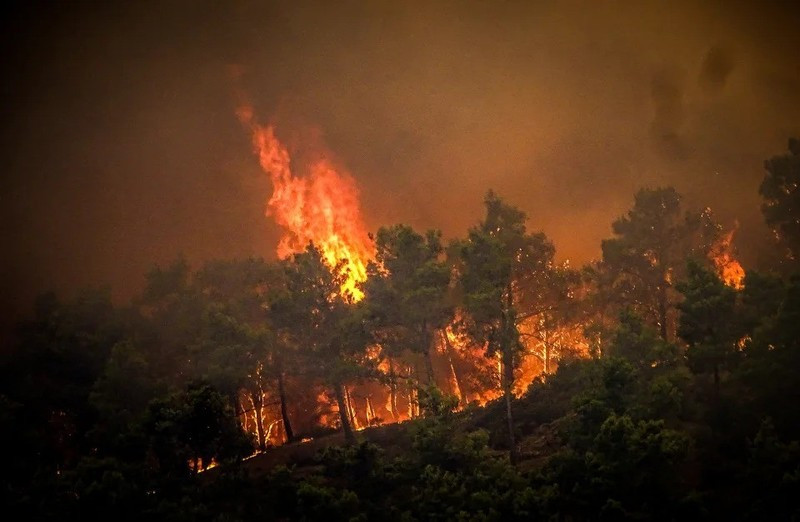Intense heat is the cause of forest fires breaking out in many countries, forcing European authorities to mobilize all resources to respond. The European Union (EU) insists on not giving up ambition in climate goals.
The EU had to mobilize nearly half of the available firefighting aircraft to help Greece control the large forest fire in Evros.
According to the EU's Copernicus Emergency Management Service, over the past 11 days, the fire had ravaged at least 808.7 square kilometres, an area larger than New York City (the US).
According to EU officials, the fire was the largest on European soil in years
The fire that started on August 19 has decimated homes and vast tracts of forest in the Alexandroupolis and Evros region, especially in force winds and hot weather.
The fire destroyed part of the Dadia Forest in northeast Greece, a major European sanctuary for birds of prey. At least 20 people died, believed to be immigrants, because this area is the first destination for migrants from Turkey.
Meanwhile, another serious forest fire continues to destroy forests at Mount Parnitha, near the Greek capital Athens.
Hundreds of forest fires have occurred in Greece since the beginning of the year, causing damage to more than 120,000 hectares of land and forcing many people to leave their homes.
Last July, about 20,000 foreign tourists had to evacuate from the island of Rhodes, due to fierce forest fires, destroying many hotels and resorts.
During this forest fire, Greek officials issued a new evacuation order for people living in the village of Lefkimmi in the Evros region and the village of Kassitera in the neighbouring Rhodopes region.
Extreme weather also complicated the large forest fire on the island of Tenerife in Spain's Canary Islands.
Since the beginning of 2023, Spain has confirmed that more than 75,000 hectares of forest have been burned. Most of the territory of this southwestern European country has to endure extreme heat, with the southern and northeastern regions recording sharp increases in temperature, in some places exceeding 40 degrees Celsius.
Scientists say that the climate crisis is making extreme weather events, such as heat waves, droughts, super storms and floods, more frequent and intense, becoming a cause for concern in the Mediterranean region.
Heatwaves are warned to occur more often with greater intensity and impact on a much larger scale. This situation requires countries in the region to adapt and reconsider their disaster prevention measures.
The intense heat and extreme weather events that seriously affect people's lives make the EU even more determined to prevent climate change.
European Commission Executive Vice-President Maros Sefcovic said "We are not going to dilute our ambition".
The fact that Europe faces a record-breaking summer of wildfires, heat waves and floods, are worrying signals about the consequences if countries fail to tackle climate change, Sefcovic said.
The EU has the most ambitious climate change policy in the world. Brussels has asked EU member states to use the bloc's money to support vulnerable communities to invest in a transition to clean energy to reduce energy costs, as well as air pollution harmful to health.
The EU has established a "fair transition fund", worth 17.5 billion euros, to support communities affected by the transition. The EU is also considering appointing a new commissioner to directly manage EU climate change policies and be the bloc's negotiator at the UN climate talks this November.
In the first half of this year, EU fossil fuel energy production fell to a record low, and green energy sources are filling the gap, according to Ember Climate, a climate research organisation. EU solar power production increased by 13% in the first half of this year, compared to the same period in 2022, while wind power increased by 4.8%.
However, in the first six months of this year, the increase in clean energy has not been enough to fill the gap caused by the reduction of fossil fuels.
Scientists warn that the current need to reduce the use of fossil fuels has not reached a sustainable and desirable level.
With demand expected to grow in the future, a faster transition to alternative sources can help Europe realise its ambitious commitments to combat climate change.
















